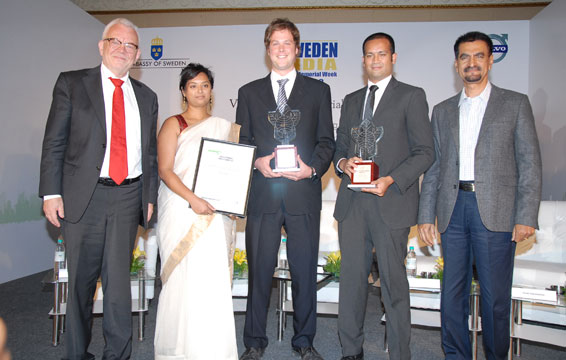
Photo: 255304
Bangalore honoured in sustainable mobility awards
29 October 2012
by Richard Forster
Two transport initiatives from Bangalore, India, took joint first prize today in Volvo’s second Sustainable Mobility Awards. EMBARQ India and India Urban Space Foundation, through its project Tender SURE, were presented with their shared prize at the Sweden-India Nobel Week Seminar in Bangalore.
EMBARQ India was recognised for its ongoing pilot project with the Bangalore Metropolitan Transport Corporation that is aiming to reduce travel time by an average of 20 minutes for its 275,000 bus passengers every day.
The strategy they have adopted in achieving this includes changing Bangalore’s bus system from a ‘direct services model’ to a ‘connective system model’, together with improving transfer facilities, signage, and fare restructuring.
Speaking from Mumbai, Madhav Pai, Director of EMBARQ India, told Cities Today that this restructuring would “result in a reduction in the number of routes, reduced travel time, improved capacity on feeder routes, improved flexibility for system planners to match supply to demand, and simplified user systems such as maps and intuitive naming conventions.”
Pai also emphasised that the key to the project is that there are no additional on-going costs for cities. “It involves a one-time capital investment to build transfer hubs,” he added. “However, the benefits to passengers by implementing this new system would induce additional demand for regular as well as specialised services, and thereby influence an increase in revenue earned.”
The company and city transport corporation hope to replicate the model for other arterial roads in Bangalore and across other cities, once complete. EMBARQ India says that the model is a key answer to the increasing pressure on the city’s urban transport system, as it helps the city provide high-quality and efficient and public transport.
From improving the system on the road to improving how roads are built, Project Tender SURE, was recognised for its plan to overhaul India’s often chaotic road design and implementation, and replace this with a systematic and disciplined approach in the design, procurement and execution of city roads. Volvo recognised the innovation of the project’s multi-stakeholder approach that includes an easy scalable model and on-going technical support.
A runner-up and special recognition awards were also presented which included a group from the Indian Institute of Technology Madras. The team was praised for its ongoing development of a passenger information system that can provide accurate, real time bus information under the challenging Indian traffic conditions.
Speaking at the presentation Akash Passey, Senior Vice President and Chairman of the Board, Volvo Buses India, said: “The response for the second season of Volvo Sustainable Mobility Awards has been very encouraging and this is an indication of increasing inclination of various stakeholders and society in general to develop and adopt sustainable transport solutions in the country.”









